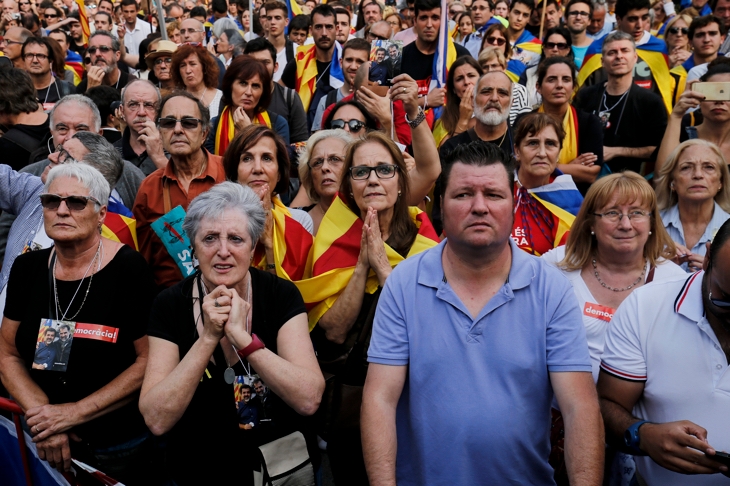If you have seen images from earlier today when the rump Catalan parliament – vacated by the non-separatist MPs, about half of the chamber – voted to unilaterally declare independence, you may have wondered about the serious look on parliamentarians’ faces. Why the sombre visages, if this is the defining moment in their careers: the birthday of their long-craved republic?
Perhaps they are worried about the uncertainty of what comes next, and the expectation that it will not be good. The Spanish government has, after all, just obtained a mandate to enforce constitutional provisions by which it will temporarily take control of the Catalan administration. The aim is to restore the legal order and clear the way for new regional elections and a legitimate and law-abiding government.
That of course doesn’t bode well for the present Catalan cabinet, which will be swiftly deprived of any powers. The Catalan president and his advisors may also face criminal charges for their consistent disobedience of the Catalan constitution, the Spanish constitution and a raft of court rulings striking down separatist legislation.
That could explain their unenthusiastic reaction to this afternoon’s independence vote. But I want to suggest a different set of reasons for their seriousness. They are, like the revolutionary Bolsheviks witnessing Stalin’s purges two decades later, coming to realise the catastrophic consequences of their actions. For Spain, but first and foremost, for Catalonia.
Consider the events which have succeeded the ill-fated independence referendum on 1 October. More than 1,700 firms of all sizes – from Catalonia’s biggest banks to scores of small- and medium-sized enterprises – have moved their headquarters outside the region.
Whether pro- or anti-independence, and business opinion is largely opposed for understandable reasons, managers fear the immediate effects of separation. It would put Catalonia outside the EU, remove its banks from under the umbrella of the European Central Bank, and pose very significant supply-chain problems for industrial and services firms that form the backbone of the Catalan economy.
The run-up to the referendum has also witnessed the steady polarisation of Catalan society, which is split on the question of an independence vote, although polls show most Catalans to be against separation. The move for unilateral independence has also crystallised a climate of fear among those Catalans who feel Spanish and who for years have found it difficult to make their voices heard, to have their children taught in Spanish rather than Catalan at public schools, and to counteract nationalist propaganda about the history and grievances of the region.
For most foreigners, Barcelona is a tourist destination with a vibrant nightlife. But for Hispanic intellectuals it was long a haven of culture, liberalism and openness – a place where literature in Spanish flourished alongside art and music. Nationalism has progressively eroded the cosmopolitanism that once characterised Catalonia, to the point where most publishing houses and not a few intellectuals have permanently moved to Madrid.
Much like the central European nationalists who came to power after the Great War, the Catalan separatists have gradually turned a multicultural enclave that hosted luminaries such as George Orwell and Nobel laureate Gabriel García Márquez into a tragic parody of a nation-state. If it indeed became independent, Catalonia would doubtless become poorer, less diverse, more violent and less welcoming.
All Western observers of good will and historical acuity should welcome the Spanish government’s overdue intervention. But it may already be too late to recover the Catalonia we once knew and cherished.
Diego Zuluaga is Head of Financial Services and Tech Policy at the Institute of Economic Affairs. He writes in a personal capacity.






Comments